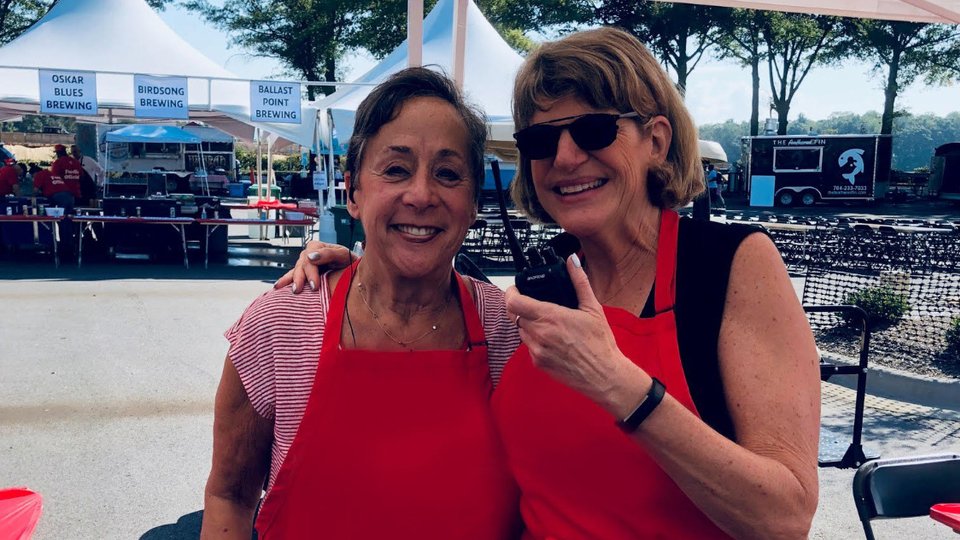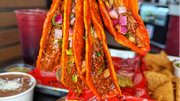Marketing
Food Truck Ventures shares tips, advice, insight for food truck success
Food Truck Ventures, based in New England, is all about supporting 400 local food trucks and its catering division is booming. Founder Anne-Marie Aigner shares tips, advice for building a successful food truck business as well as why some food trucks don’t succeed.

March 6, 2023 by Judy Mottl — Editor, RetailCustomerExperience.com & DigitalSignageToday.com
Anne-Marie Aigner is a busy woman. She's the founder of Food Truck Ventures and Neighborhood StrEATS & Food Trucks 2 Go, as well as president of the Aigner/Prensky Marketing Group.
While her to-do list is full and long, her passion and focus are simple: Supporting and growing the food truck industry in the New England region — which numbers about 400-plus food trucks.
Given her extensive experience and background with the food truck business environment, FoodTruckOperator reached out to Aigner for insight, tips, advice and her expertise on how food truck operators can succeed, the common pitfalls that come into play and how to hurdle the top challenges.
Q. Let's start with background on Food Truck Ventures. What it's all about?
A. Food Truck Ventures books food trucks for special occasions like weddings, bat/bar mitzvahs, graduations, birthdays under our Neighborhood StrEATs division, set up in 2020 when COVID shut down restaurants and shut us all indoors. StrEATs has morphed as COVID has subsided, but our catering division — Food Trucks 2 Go (FT2G) — has taken off more than we could have imagined as companies try to welcome their employees back to their offices.
Through it all, Food Truck Ventures and its divisions have generated steady business for our 400 New England food trucks through some very challenging times. (In early 2020, as COVID exploded, we sold our previous company, Food Truck Festivals of America — set up in 2011 — after producing more than 100 large food truck festivals around the country.)
Q. What is your role with FTV and how long have you been a part of FTV?
A. I am the president of Food Truck Ventures and founder. My partner, Janet Prensky, handles the FT2G division.
Q. How many food trucks are involved or participate with FTV and how does that relationship work?
A. After working with food trucks for over 12 years, with a focus on New England food trucks, we have close and trusted relationships with over 400 food trucks throughout the region. We had more than 650 food trucks on our list before COVID. We do the bookings, the management of menus, paperwork, budgets and interface with the clients both before, during and after their events to be sure everything goes as it should.
Q. The food truck industry has undergone tremendous changes since the pandemic hit and what are the biggest changes from your view and what drove those changes?
A. Food trucks depend on crowds and foot traffic for most of their business. If/when crowds disappear — as they did during COVID — they struggle. Some shut down completely, some just pulled back and started doing take-out/pick-up/delivery — and some depended on the bookings that Food Truck Ventures and other booking companies started doing for neighborhoods and non-profits.
At the beginning of COVID, FTV/StrEATs were very busy so we were able to keep many trucks chugging along with smaller bookings. When restaurants began to re-open and neighborhood events started to diminish, trucks started booking themselves for large office complexes and apartment buildings, hospitals, etc. and FTV/FT2G got busier with corporate catering requests, which has kept both us and many of our trucks quite busy.
In addition, while the trucks were happy to waive all additional fees during COVID just to retain the business, once COVID subsided and they began to book themselves more and more, we instituted minimum guarantees for all non-corporate and/or events paid by attendees, which is taking some getting-used-to for clients (the client pays the difference if sales are lower than the minimum guarantees).
The biggest change since the pandemic: Food trucks are busier than ever with clients now booking months in advance since there are fewer trucks to choose from and the trucks are booking up more and more.
Q. Now nearly three years since the pandemic hit, what is the food truck industry if you can describe it in one word or a few (i.e., stable, growing, etc.) and what's driving that status?
A. When we started working with food trucks in 2011, most of the public still thought of "mobile food kitchens" as the old roach coaches/canteen trucks. Clearly, that perception has drastically changed as more and more foodies discovered the amazing food and menus that the food trucks offer. Food trucks/food carts have been around for a century, as immigrants arrived and set up street food carts. With cheaper food and creative menus, strict oversight by local health departments, adherence by reliable food truck owners, food trucks have more and more become mainstream and another convenient dining option, not instead of other options (like brick-and-mortar restaurants) but as a complement to them. In one word: Become "delicious."
Q. Given all your interaction with food truck operators what are the top challenges right now in 2023?
A. The number one challenge facing most food trucks is the lack of standardization of the rules and over regulation by public agencies. In Massachusetts alone, there are 352 cities and towns and almost as many different sets of rules and permitting fees for food trucks. In Rhode Island, one state-wide health/fire permit is required. In most states, however, food trucks have to be permitted by each town they are operating in. This is not only very time consuming in that the trucks have to take a whole day to go to the town to be inspected, but they also lose the sales from that day. Since most food trucks are small businesses, loss of revenue for even one day can be risky.
We are now working with the National Institute for Justice, a non-profit that works with food trucks state-by-state, to address over regulation of food trucks which has had some success in Colorado and Georgia and is just beginning to work with us in Massachusetts on ways to support food trucks while keeping them safe as dining options.
Q. If you were asked by a wanna-be food truck operator what they need to know what would you advise?
A. Patience and research. Food trucks are 24/7 operations so keep that in mind and be ready to work — a lot. And, with the continuing labor shortage, truck owners are having to do much of the work themselves. In order to succeed, a creative menu is fundamental, especially a menu that offers meals that no one else is offering. Research the market — what's already being offered and how can you distinguish your menu.
Quick meals, especially if you have long lines — if folks have to wait too long, they won't come back. If your menu is mac 'n' cheese with toppings, you can serve one customer every 30 seconds (which) equals 100-plus meals per hour, so figure out your sales. If, however, you are trying to do custom meals per customer that takes minutes to cook, you are negatively impacting your bottom line, especially at large events where turnaround is critical.
Also, a mistake that we see often is that the truck is named something that doesn't describe the menu or cuisine — e.g., Alden Park, one of our most successful trucks because he also has a brick-and-mortar, but, otherwise, what does he serve? What is his menu?
Location is also critical — even with the best menu in the world, if your truck is parked where there are no customers, sales will be limited. Research your market — try to get in on lotteries that assign spaces to food trucks since those spaces usually are well-trafficked. And talk to other truckers. They will be your best advisors and consultants and are usually more than happy to share their experiences.
Q. What are the characteristics of a successful food truck, and vice versa — why do some food trucks fail?
A. Successful trucks have:
- Right locations — we find that regardless of menu, most foodies will order from almost any food truck. It is important to be where there are lots of people — e.g., large office complexes, hospitals, large events, etc.
- Clean, colorful easy-to-read menus.
- Unique, creative, affordable menus with good portion sizes.
- Interaction with customers (turning one-timers into regulars).
- Sampling — coming out of the truck to offer tastes/samples to passersby — in fact, if you're planning to participate in a large event, be sure to bring enough staff to keep up with demand.
- Strong social media presence — and keeping up with social media and customers via social.
- Getting into all major festivals and events (The fees are often high but the sales returns are usually well worth paying the fees.)
- Getting onto the food truck lists used by booking agents (such as Food Truck Ventures/Food Trucks 2 Go) — we are always looking for new trucks to book.
Why do some trucks fail?
- Bad food.
- Dirty trucks.
- Inconsistent service. If a customer has to wait and/or has a bad meal, they will not keep you in mind for a private event and/or recommendation to their friends. And, with social media, bad reviews will kill your business.
- Underfunding. To enter the food truck business usually demands about $85,000 to $125,000, depending on the condition of the truck. Yes, it can be done for less — but that's the average upfront cost.
- Commitment — and patience. Both are needed — without them, even the best menus and trucks will struggle. Even the most successful food trucks have bad days/weeks. Things usually get better, especially with good weather and no pandemics!
 ChatGPT
ChatGPT Grok
Grok Perplexity
Perplexity Claude
Claude





